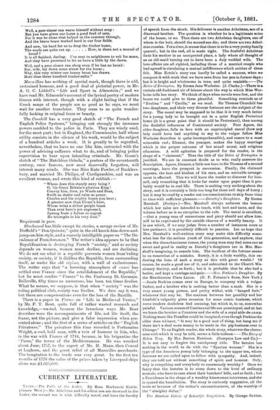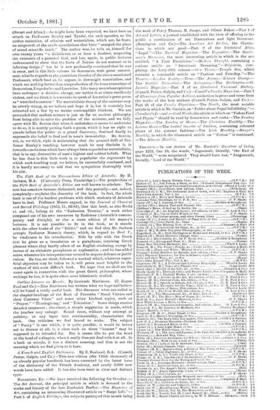The Baseless Fabric of Scientific Scepticism. By George Sexton.
(Smart and Allen.)—As might have been expected, we have here an attack on Professors Huxley and Tyndal, the arch apostles, as the author maintains, of atheism and materialism, which are, he fears, an outgrowth of the crude speculations that have usurped the place of sound scientific truth." The author was, he tells us, himself for over twenty years "a disbeliever, or at least a doubter, respecting the existence of a personal God, and has, again, in public lectures endeavoured to show that the facts of Nature do not warrant us in inferring design ;" but he is now profoundly convinced that he was in error, and in this little volume he denounces, with great earnest- ness, what he regards as the pernicious theories of the above-mentioned Professors, which land us, lie argues, in downright materialism, and which are nothing better than a reproduction of the lame reasonings of Democritus, Empedoelez, and Lucretius. Like many men whoseopinions have undergone a decisive change, our author is at times needlessly • violent, and we think it is a mistake to speak of Lucretius's great poem as "wretched nonsense." The materialistic theory of the universe may be utterly wrong, as we believe and hope it is, but it certainly has attracted not a few by no means contemptible thinkers. We are persuaded that modern science is just as far as ancient philosophy from being able to solve the problem of the universe, and we fully -agree with Mr. Sexton that when it undertakes or seems to undertake to do so, it is merely putting forth a guess, which it has no right to parade before the public as a grand discovery, destined finally to supersede the belief in God and in man's immortality. Mr. Sexton, too, is, we think, right in maintaining that the general drift of Pro- fessor Huxley's teaching, however much he may disclaim it, is towards conclusions which have always been regarded as materialistic, that is to say, destructive of man's highest and noblest beliefs. What he has done in this little work is to popularise the arguments by which such teaching may, we believe, be successfully combated, and it is hardly necessary to add that we sympathise thoroughly with his aim.































 Previous page
Previous page